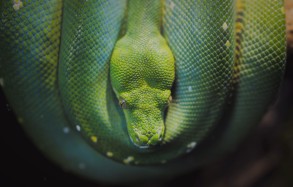In Sarah Perry’s The Essex Serpent we enter the intimacies of Cora Seagrave who, upon the death of her brutish, un-loving husband, indulges her hobby of fossil hunting by moving to Aldwinter, a village on the banks of the Blackwater estuary in Essex. It is here where she first hears of the villagers’ belief that a mythical serpent has returned to terrorise them after centuries of dormancy, despite the fact no-one can actually claim to have seen it. On her quest to get to the bottom of the mystery, she befriends the local vicar, Will Ransome, and his family.
The novel moves between the Essex countryside and a society stuck in the past, and London, a city where developments are moving too quickly for society to keep up. The most interesting ‘London’ character is ‘the Imp’ Luke Garratt, a brilliant and innovative surgeon, whose contemporaries are disgusted by his attempts to perform ever increasingly intricate operations. Luke pushes the out-dated boundaries which force him to battle his superiors whose stethoscopes are firmly stuck in the past. His character provides a fairly gripping side-story in his quest at medical advancement, and even though I didn’t particularly like him as a character (his desperation for Cora was a little pathetic), he represents the kind of forward thinking and bravery we all could do with.

The exploration of late Victorian life and the character’s reaction to the massive social developments, such as Darwinism and the effects of the industrial revolution, is certainly interesting. Our protagonist Cora’s character is modern and refreshing in a society that represses any feminine expression that breaks with the norm, which Cora does in her love of the sciences. However, when it comes to it, we don’t witness Cora actually doing any real work. Sure, she roams about the countryside in men’s clothes getting muddy, but she fails to even begin looking for the truth about the serpent as she was so keen to do at the beginning of the story. Perry seems more concerned about developing Cora’s relationship with Will and the other male characters than with the sciences. As a result, the promisingly unconventional female lead ends up defined by her relationship with a man, a disappointing cliché I thought Perry was going to steer clear of at the beginning. The
relationship that develops between Cora and Will initially appears to be one that will defy Victorian convention, one built on mutual respect, but again, this fails with the couple’s drawn-out and inevitable seduction.
It’s a clever story, well written and packed full of double-entendres (I mean, it’s a ‘snake’ that’s terrorising the village…) which can be fairly amusing without meaning to be, but nothing much actually happens. The anticipation that the serpent would at least materialise and produce some sort of action is never fulfilled, despite a few ‘sightings’ and as a result the story is a bit dull.
Overall rating: 5/10
